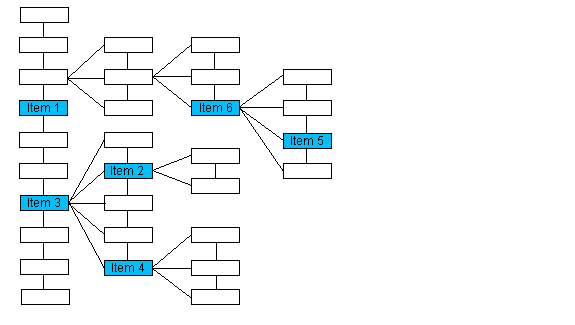
|
Available in LEADTOOLS Medical Imaging toolkits. |
#include "Ltdic.h"
L_LTDIC_API pDICOMIOD L_DicomGetParentIOD(pIOD)
|
pDICOMIOD pIOD; |
/* pointer to a DICOMIOD structure */ |
Returns a pointer to the item in the IOD Structure that contains the parent of the specified item.
|
Parameter |
Description |
|
pIOD |
Pointer to a DICOMIODstructure that contains an item in the IOD Structure. |
Returns
|
!NULL |
A pointer to a DICOMIODstructure that contains the item in the IOD Structure that is the parent of the item specified in pIOD. |
|
NULL |
pIOD has no parent. (pIOD is a Level 0 item.) |
Comments
This function requires that the IOD Structure is evaluated as a tree structure.
The parent is the ancestor one level higher than the specified item. If the specified item is a Level 0 item, this function will return NULL. Please note that the numbering of the items in this illustration is arbitrary and does not imply order.

|
If the passed pointer points to : |
The function returns a pointer to : |
|
Item 1 |
NULL |
|
Item 2 |
Item 3 |
|
Item 4 |
Item3 |
|
Item 5 |
Item 6 |
The following functions will also help you navigate the IOD Structure:
Required DLLs and Libraries
|
LTDIC For a listing of the exact DLLs and Libraries needed, based on the toolkit version, refer to Files To Be Included With Your Application |
Win32, x64
See Also
Example
This example displays the parent's name of an item
L_INT DicomGetParentIODExample(L_VOID)
{
pDICOMIOD pParent;
pDICOMIOD pElement;
pElement = L_DicomFindIOD(NULL, TAG_PATIENT_NAME, IOD_TYPE_ELEMENT, FALSE);
if (pElement != NULL)
{
pParent = L_DicomGetParentIOD(pElement);
MessageBox(NULL, pParent->pszName, TEXT("Notice"), MB_OK);
}
return DICOM_SUCCESS;
}